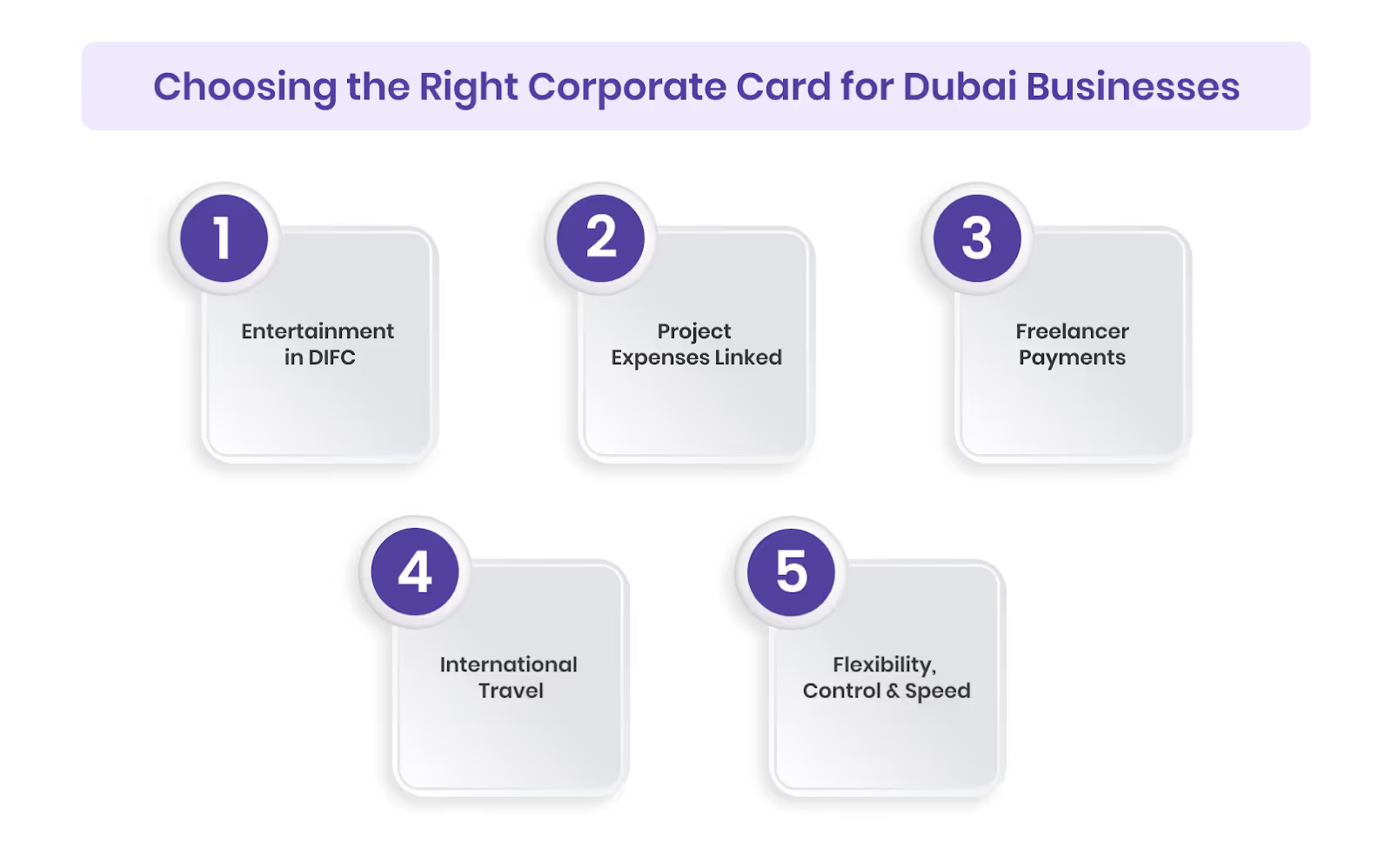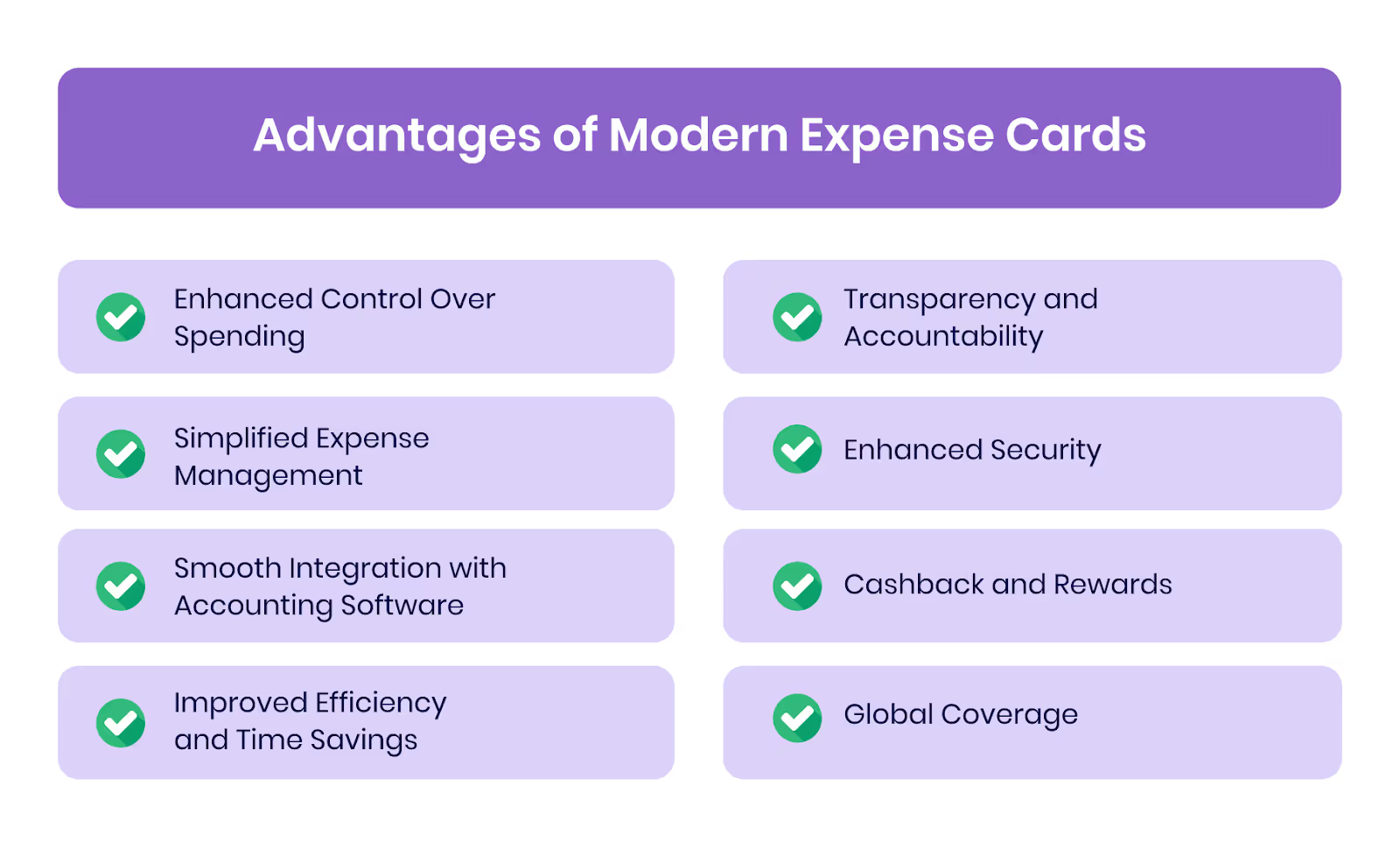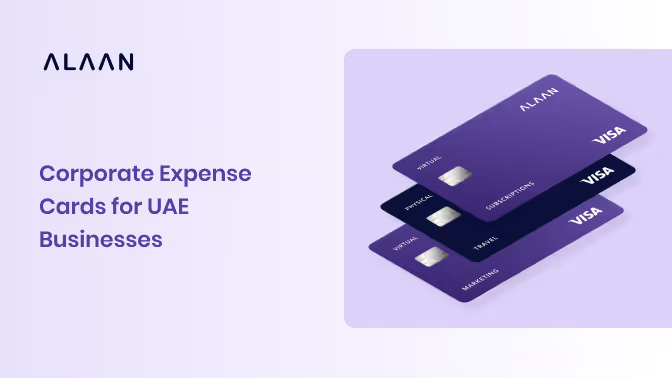The UAE’s fintech sector is projected to reach USD 5.71 billion by 2029. This growth reflects how quickly businesses in the region are embracing digital solutions to simplify financial operations.
Yet, when it comes to managing business expenses, many companies still face challenges that feel like juggling too many tasks at once. Traditional reimbursement processes, manual approvals, and petty cash management frequently cause delays, errors, and compliance challenges.
This is where corporate expense cards provide a smarter approach, giving UAE businesses better control, faster approvals, and automated tracking. These cards also ensure compliance and improve operational efficiency.
In this blog, you will explore how Dubai businesses cut costs and save time with expense cards, ensuring compliance and overcoming banking limitations.
Key Takeaways:
- Corporate expense cards provide customisable spending limits, vendor restrictions, and real-time visibility, giving UAE businesses tighter financial control.
- Automated expense tracking, receipt matching, and VAT checks reduce errors, simplify reporting, and support faster, compliant decision-making.
- Smooth integration with platforms like Xero, QuickBooks, and NetSuite makes reconciliations smoother while ensuring VAT compliance.
- Modern cards offer 2% cashback on eligible international transactions, turning routine spending into savings.
- As businesses scale, these cards grow with them by delivering fraud protection, real-time controls, and flexibility for their needs.
Choosing the Right Corporate Card for Dubai Businesses

Choosing a corporate card in Dubai means looking at the city’s business environment a little differently. Unlike London or New York, Dubai’s market is fast-moving and diverse, which makes it important to have a card that’s flexible and tailored to local business needs.
The right card should cover routine operational costs and align with the wide range of spending needs that come with doing business here.
Below are some of the major spending categories that Dubai companies often deal with:
1. Client Entertainment in DIFC
Client entertainment plays a key role in building and maintaining strong business relationships in finance, legal, and consulting companies. In districts like DIFC, business lunches, networking dinners, and corporate gifting are a regular part of the culture.
To manage these expenses smoothly, businesses need a corporate card solution that offers:
- Expense flexibility: The ability to handle frequent, high-value transactions without limitations.
- Global acceptance: A card that works smoothly for international payments, ensuring no hiccups when entertaining overseas clients.
2. Project Expenses Linked to Expo 2020 Legacy Sites
The transformation following Expo 2020 has sparked large-scale projects in areas such as District 2020 and Dubai South.
Companies in construction, logistics, and sustainability often oversee on-ground teams and manage recurring supplier or equipment costs. For them, a reliable corporate card should provide:
- Real-time expense tracking: Capturing project-related spending the moment it happens.
- Scalable features: A solution that grows with the scale of projects and evolving business needs.
3. Freelancer Payments in Dubai Media City and JLT
Startups and creative agencies in hubs like Dubai Media City and JLT often work with freelancers, consultants, and contractors. In these cases, one-off payments, quick approvals, and proper documentation are crucial to maintaining a steady workflow.
Corporate cards can help by offering:
- Speed and efficiency: Quick approval workflows that minimise delays.
- Documentation and compliance: Automatic receipt capture and expense categorisation, which cuts down paperwork and simplifies audits.
4. International Travel
Dubai’s location makes it a natural hub for international business, with frequent trips to cities such as Riyadh, Doha, London, and beyond. For smooth travel arrangements, companies need a corporate card solution designed to handle global spending. Key features include:
- No foreign transaction fees: To avoid unexpected costs from cross-border payments.
- Global coverage: A widely accepted card system, available in both virtual and physical formats for convenience on the go.
5. The Need for Flexibility, Control, and Speed
Dubai companies need flexibility, control, and speed to manage their expenses effectively. From client entertainment to international travel, businesses must also stay compliant with UAE VAT regulations while avoiding financial surprises.
To achieve this, the right corporate card should include:
- Customisable spending limits: Enabling tight control over various expense categories.
- Real-time spend visibility: Giving businesses instant insights into spending patterns.
- Integration with accounting systems: Simplifying reconciliation and ensuring VAT accuracy.
Before selecting the right corporate card, it’s important to understand the limitations of traditional banking solutions.
Limitations of Traditional Banking Solutions
Today, traditional banking solutions often struggle to keep up with the changing needs of modern companies. While they have served as the backbone of financial operations for years, these solutions come with limitations that can hold back efficiency, flexibility, and growth.
Let’s take a closer look at some of the key challenges businesses face when relying solely on traditional banking for managing their finances.
1. Slow and Cumbersome Processes
Traditional banking systems often involve long, manual procedures for transferring funds, approving payments, and reconciling accounts. These slow workflows can delay wire transfers and international payments by several days, disrupting cash flow and time-sensitive operations.
The challenge lies in the sluggish approval process, resulting in delayed payments to vendors, suppliers, and employees, which can strain relationships and business operations.
2. Limited Flexibility
Many traditional banking solutions are rigid and don’t adapt well to changing business needs. Standard corporate accounts rarely allow customised spending limits or real-time expense tracking, making it difficult to control costs across departments.
The challenge is the lack of real-time tracking and spend controls, and the impact is inefficient expense management and potential budget overruns.
3. High Fees and Hidden Costs
Traditional banks often charge high fees for basic services such as account maintenance, wire transfers, and international payments. Hidden costs for currency conversion, overdrafts, and ATM withdrawals can quickly add up, especially for SMEs.
The challenge is excessive transaction and account management fees, and the impact is reduced profitability and increased financial strain for smaller businesses.
4. Lack of Integration with Modern Tools
Businesses today rely heavily on accounting, invoicing, and reporting software. Traditional banks often fail to integrate smoothly with these tools, forcing companies to manually enter data across multiple systems.
The challenge lies in incompatibility with modern financial tools, resulting in a higher manual workload, increased errors, and difficulty maintaining accurate financial records.
5. Limited Access to Credit and Cash Flow Solutions
Accessing credit lines or loans through traditional banks usually requires extensive documentation, collateral, and lengthy approval processes. This can be a barrier for SMEs or startups without strong credit histories or assets.
The challenge is strict lending criteria and slow approvals, and the impact is limited working capital, which can slow growth and expansion opportunities.
6. Security Risks and Fraud Vulnerabilities
Despite improvements in banking security, traditional systems remain vulnerable to cyberattacks and fraud. Many businesses rely on outdated security measures, leaving them exposed to financial loss.
The challenge is the ongoing risk of cyber threats, and the impact is potential financial damage and harm to the company’s reputation.
7. Inefficiency in Managing Global Operations
For businesses operating internationally, traditional banks often struggle to manage cross-border payments efficiently. Wire transfers can be slow and expensive, with poor exchange rates and hidden fees.
The challenge is the inefficiency of international payments, and the impact is delayed supplier payments and complications in maintaining global client relationships.
8. Limited Customer Service Availability
Traditional banks often have long response times and limited access to live support, making it difficult to resolve urgent issues quickly. The challenge is slow customer support, and the impact is disruption to financial operations and delays in addressing critical banking needs.
Recognising these limitations makes it clear why modern expense cards offer a smarter, more efficient alternative.
Advantages of Modern Expense Cards

Today, traditional ways of managing expenses just aren’t enough. Companies need tools that provide real-time control, efficiency, and smooth integration to stay ahead. Modern expense cards deliver exactly that. Here are the main benefits of using modern expense cards for your business:
1. Enhanced Control Over Spending
One of the biggest advantages of modern expense cards is the level of control they give businesses. Finance teams can set customised rules that fit their needs. For example:
- Set spending limits: Admins can assign individual caps for employees based on their role, department, or budget.
- Restrict vendor access: Transactions can be limited to specific vendors, ensuring policy compliance and preventing unauthorised purchases.
- Monitor spending in real time: Every transaction appears instantly, giving business owners and finance teams immediate visibility and the ability to step in if needed.
2. Simplified Expense Management
Modern expense cards simplify the expense management process through:
- Instant expense tracking: Purchases are automatically logged into the expense management platform, removing the need for manual entries.
- Automated receipt matching: Employees can upload receipts via apps or email, while AI matches them to the right transactions, reducing paperwork and human errors.
- Custom approval workflows: Finance teams can design approval flows that mirror their company’s structure, ensuring every expense is reviewed by the right person.
3. Smooth Integration with Accounting Software
Modern expense cards integrate smoothly with accounting tools like Xero, QuickBooks, and NetSuite. This brings several clear benefits, such as:
- Automatic syncing: Transactions flow directly into your accounting system, reducing manual work and keeping records up to date.
- Faster reconciliation: Real-time updates and auto-categorisation make reconciliations quicker and more accurate.
4. Improved Efficiency and Time Savings
Time is one of the most valuable resources for any business, and modern expense cards help save plenty of it through:
- Automation of manual tasks: No more chasing receipts, manually tracking expenses, or endless reconciliations.
- Simplified reporting: Real-time reports let finance teams and business owners access up-to-date financial data instantly, without waiting for month-end.
- Faster approvals: Automated workflows speed up expense approvals, cutting down delays and reducing admin bottlenecks.
5. Transparency and Accountability
Modern expense cards make spending clearer and more accountable. Every transaction is visible in real time, which builds trust and reduces risks. This helps in:
- Greater financial transparency: Expenses are tracked, recorded, and accessible instantly, making reporting straightforward.
- Accountability: Each transaction is tied to an employee and their approved budget, ensuring spending aligns with company policies.
6. Enhanced Security
Security is built into the design of modern expense cards, helping businesses protect themselves from potential threats through:
- Instant card freezing: Lost or compromised cards can be frozen or cancelled immediately, blocking unauthorised use.
- Fraud detection tools: Many cards include built-in monitoring systems that flag unusual activity and send alerts.
- Two-factor authentication: Extra layers of login security ensure that only authorised users can access the platform.
7. Cashback and Rewards
Beyond efficiency and control, many modern expense cards also bring direct financial benefits through cashback and rewards, such as:
- Cashback on business purchases: From office supplies to travel and client entertainment, companies can earn money back on routine expenses.
- Rewards programmes: Some cards provide points or perks that can be redeemed for travel, services, or other business-related costs.
Also Read: Points. Miles. Cashback. Confused by corporate cards perks?
8. Global Coverage
Modern expense cards are also designed to work without borders and are perfect for businesses with international operations. They come with:
- Worldwide acceptance: They’re usable at millions of locations globally, making it easy for employees to transact anywhere.
- No foreign transaction fees: Many cards eliminate hidden fees, keeping international spending cost-effective.
Along with efficiency and convenience, modern expense cards also help businesses stay aligned with UAE regulations.
Compliance with UAE Regulations
In the UAE, regulatory compliance is a fundamental aspect of running a business. Understanding and adhering to local regulations is crucial for ensuring smooth operations and avoiding legal pitfalls.
This is particularly true when it comes to managing business finances, taxes, and expenses. Here's how businesses can stay compliant with UAE regulations:
1. Understand UAE VAT Regulations
The UAE introduced Value Added Tax (VAT) in 2018 at a rate of 5%. Since then, VAT has become an essential part of doing business in the country. To stay compliant, companies need to follow a few key requirements:
- VAT registration: Businesses with an annual turnover above AED 375,000 must register with the Federal Tax Authority (FTA). Companies with a turnover between AED 187,500 and AED 375,000 can also register voluntarily if they choose.
- VAT on goods and services: VAT applies to most goods and services sold in the UAE. Invoices must be VAT-compliant, clearly showing the VAT amount for each transaction.
- Invoices and documentation: Businesses need to maintain proper records to support VAT filings. This includes sales invoices, purchase invoices, and proof of VAT payments.
Use accounting software that follows UAE VAT standards. Make sure all receipts and invoices are VAT-compliant, including tax registration numbers and correct VAT rates. Also, file VAT returns regularly with the FTA to avoid penalties.
2. Ensure VAT Compliance with Corporate Cards
If your business uses corporate cards, VAT compliance becomes even more important. While these cards simplify expense management, every transaction still needs to meet UAE VAT regulations. Corporate cards help with VAT compliance through:
- Automatic VAT extraction: Many modern cards, when paired with expense management platforms, can extract VAT details such as TRN and VAT amounts directly from receipts.
- Real-time tracking: Finance teams get instant visibility into VAT-related expenses, making it easier to spot issues before they affect filings.
- Automated reminders: Systems can remind employees to upload VAT-compliant receipts, ensuring deadlines are not missed.
Also Read: What are corporate cards, and how do they work?
3. Financial Reporting and Transparency
Businesses in the UAE are expected to maintain transparent financial records in line with local accounting standards. While there’s no single mandatory system, accurate reporting is non-negotiable. This includes:
- Accurate bookkeeping: Every income or expense must be recorded correctly and on time.
- Annual financial statements: Companies should prepare balance sheets, income statements, and cash flow statements, which may be requested by authorities.
- Audits: Some businesses, especially larger ones, may be required to undergo annual audits by external auditors to verify financial accuracy.
Record all transactions consistently and without delays, and adopt automated accounting and expense tools to minimise errors. Also, use corporate cards that connect directly to your accounting software for accurate and transparent reporting.
4. Employee Expenses and Company Policies
Employee expenses like travel, client entertainment, or project-related costs need careful handling to ensure compliance with UAE regulations. This includes:
- Employee reimbursements: Any reimbursements for business expenses must be properly documented and follow VAT rules.
- Entertainment and gifts: Not all entertainment or gift-related expenses are fully VAT-deductible, so it’s essential to know which categories qualify.
Put a clear expense policy in place and communicate it to employees. Use corporate cards with built-in controls and automated expense tracking. Also, conduct regular audits of employee expenses to catch discrepancies early.
5. Data Privacy and Security Regulations
The UAE has strengthened its data privacy framework with the introduction of the Data Protection Law. For businesses, this means that handling financial and personal data responsibly is a legal requirement. It includes:
- Data protection: Companies must secure customer and employee data, including sensitive financial information like invoices and card transactions, from misuse or breaches.
- Payment security: Businesses that use corporate cards need to follow strict payment security protocols to guard against fraud or cyber threats.
Use encrypted, secure payment systems for all transactions and train your staff regularly on data security and privacy practices. Ensure financial platforms and expense tools align with UAE data protection laws.
6. Customising Compliance Strategies for UAE Businesses
Every business in the UAE faces different compliance needs depending on its size and structure. Companies need tailored strategies to stay compliant, such as:
- For SMEs: Focus on VAT registration, keep accurate records, and follow proper documentation practices.
- For startups: Build a strong expense management system from the start that covers VAT, accounting, and scaling needs.
- For large enterprises: Emphasise stronger internal controls, conduct regular audits, and ensure cross-border transactions comply with both UAE and international standards.
These compliance requirements show why adopting smart expense solutions can make a real difference for businesses.
Case Study: How a Dubai Creative Agency Saved 58 Hours Monthly with Expense Cards?
Industry: Creative Services (Costume Production & Design)
Challenge: Fragmented payments, limited project-level visibility, and reconciliation delays
Solution: Alaan’s AI-powered expense management platform with corporate cards and Xero integration
Results: 58 hours saved monthly, clearer expense visibility, and simplified project-based tracking
Stories by Zinaida is a Dubai-based creative agency that specialises in costume production and design for films and events. Known for running multiple projects at the same time, the team manages everything from sourcing costumes and materials to handling logistics for production houses across the UAE.
The Problem
Before partnering with Alaan, Zinaida’s finance processes were far from smooth. The team ran into recurring challenges that slowed them down:
- Heavy reliance on cash, personal cards, and company cards led to fragmented payments.
- Limited visibility at the project level made cost allocation difficult.
- Reconciling expenses from different payment sources caused delays in financial reporting.
For a business juggling several creative projects at once, these issues meant finance teams spent more time fixing problems than focusing on accurate, timely tracking.
The Solution
To bring order and efficiency to their financial operations, Zinaida adopted Alaan’s AI-powered expense management platform and rolled out corporate cards to its 13 team members. Here’s what changed:
- Individual corporate cards: Every team member received a card, ensuring accountability and consistency across payments.
- Project-level tagging and sub-wallets: Costs could now be tagged and allocated accurately to each production.
- Xero integration: Automated reconciliation eliminated manual entries while keeping VAT compliance in check.
- Centralised oversight: Finance teams gained real-time visibility and better control over company-wide spending.
Results
With Alaan in place, Stories by Zinaida saw measurable improvements almost immediately:
- 58 hours saved per month by reducing time spent on manual reconciliation and reporting.
- Improved visibility with real-time expense tracking that kept projects on budget.
- Simplified reconciliation through automated syncing with Xero, which also strengthened financial compliance.
At Alaan, we’re proud to support creative businesses like Stories by Zinaida. By replacing scattered payment methods with smart corporate cards, we help teams save time, gain clarity, and focus on delivering exceptional creative work.
Connect with us to discover how Alaan can transform your expense management.
This case study shows the practical benefits of how Alaan makes expense management easier for businesses across the UAE.
How Alaan Simplifies Expense Management in the UAE?
Managing business expenses across the UAE requires more than just traditional tools. Businesses need control, flexibility, and automation. At Alaan, we deliver them through modern corporate cards and an integrated spend platform.
Here’s how Alaan makes expense management simple:
- Smart corporate cards with advanced controls: Alaan offers physical and virtual prepaid cards that can be issued instantly with no setup costs. Finance teams can create unlimited cards and set spending limits, merchant restrictions, and real-time controls to keep every transaction compliant with company policies.
- Versatile for every business need: These cards are compatible with Apple Pay and Google Pay, and are accepted globally. They are ideal for handling freelancer payments, client entertainment, and international travel, all from one platform.
- End-to-end automation: Transactions are logged automatically, while AI-powered OCR matches receipts, categorises expenses, detects duplicates, and flags VAT. Smooth integrations with Xero, QuickBooks, NetSuite, Dynamics 365, and more eliminate manual work.
- Cashback rewards that add up: Earn 2% unlimited cashback on eligible international transactions, turning frequent business spend into direct savings.
- Real-time oversight and policy enforcement: Dashboards give finance teams full visibility into spending, strengthening budget control, ensuring compliance, and allowing quick intervention whenever needed.
- Built-in security and fraud protection: Features like instant card freezing, real-time alerts, and multi-layer authentication protect against fraud and unauthorised use.
- Scalable and cost-effective: If you are a startup in Media City or an enterprise with teams across DIFC, Alaan scales with your business. There are no setup costs, and unlimited cards can be issued while keeping everything under centralised control.
Wrapping Up
Corporate expense cards provide a modern way for UAE businesses to tackle the challenges of managing expenses. They help ensure VAT compliance, offer real-time visibility and control over spending, and streamline financial processes.
By reducing administrative work and providing actionable insights, these cards make it easier for businesses to operate efficiently and make informed decisions.
At Alaan, we have created an AI-powered spend management platform designed to simplify expense tracking, strengthen compliance, and cut down on manual workloads for UAE businesses. Our solution gives companies greater control over spending while integrating smoothly with existing systems.
Book a demo today to see how Alaan’s corporate cards can transform your expense management, helping your business operate with more control and efficiency.
FAQs
1. Are expense cards secure for businesses?
Yes, expense cards are secure for businesses. They come with built-in security features like fraud alerts, real-time monitoring, and the option to instantly block or freeze cards.
2. How do businesses track employee spending with expense cards?
Every transaction made with an expense card is visible in real time through a central dashboard. Finance teams can see exactly how employees are spending, ensuring that all expenses stay within approved limits.
3. What are the administrative benefits of using expense cards?
Expense cards take the pain out of admin work. They automate receipt verification, expense categorisation, and reconciliations, reducing errors and freeing finance teams to focus on more valuable tasks.
4. Can businesses set custom spending limits with expense cards?
Yes, companies can assign individual limits to employees based on their roles or departments. This keeps spending in check and aligned with budget guidelines.
5. How can businesses enforce expense policies with expense cards?
Expense cards make policy enforcement straightforward. Businesses can set spending limits, apply vendor restrictions, and even use real-time approval workflows. This ensures compliance and maintains control over financial resources.


.avif)







%201.avif)